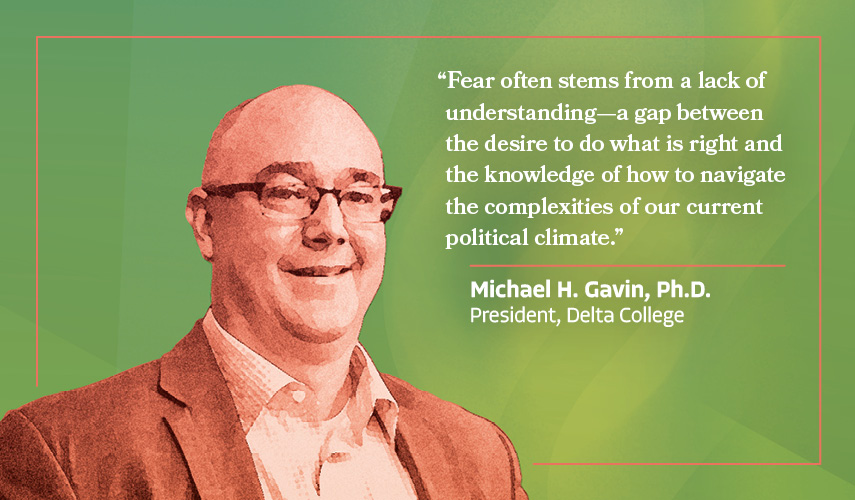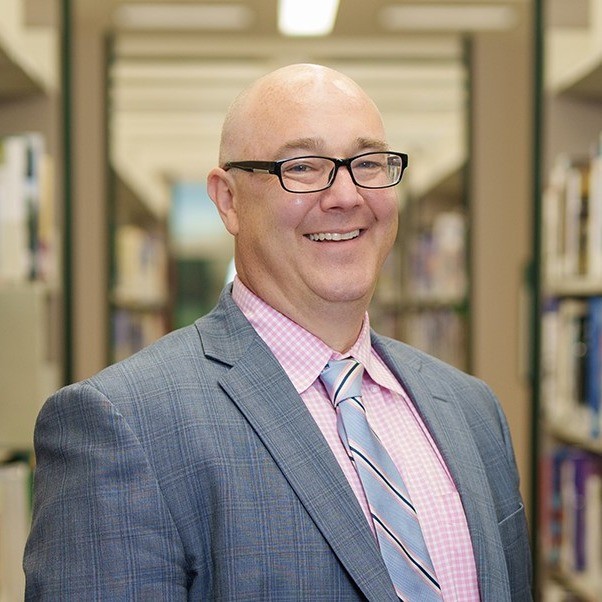
Thought Leadership
Education for All
The work of advocating for Diversity, Equity, and Inclusion (DEI) in higher education has always felt like a natural extension of who I am. The path that led me to take a stand against anti-DEI legislation and to lead the Education for All initiative was shaped long before I ever set foot in the President’s Office. It was born out of a lifetime of experiences that taught me to see the world through a lens that recognizes the power structures in place, how they oppress, and the importance of resisting them.
Fear often stems from a lack of understanding—a gap between the desire to do what is right and the knowledge of how to navigate the complexities of our current political climate.

By Dr. Michael H. Gavin,
President
Delta College
Growing up in a diverse neighborhood, I learned early on how institutions, including educational ones, can perpetuate systemic oppression through policy. As a child, I didn’t have the language to describe what I was witnessing, but the disparities were clear. My K-8 classrooms were a mix of white, Black, and Hispanic students, but by high school, those same students had been segregated into different tracks. My honors classes were almost entirely white, while my friends from the neighborhood were placed in regular or remedial classes. The only spaces where we came together were on the sports fields and in the lunchroom. These experiences left an indelible mark on me, highlighting the ways in which our systems divide rather than unite.
This awareness carried into my professional life, informing my approach as an educator and leader. When I first encountered the divisive concepts legislation introduced under an executive order, I wasn’t entirely surprised. This legislation, which threatened to undermine DEI initiatives across the nation, felt like the inevitable result of a growing politicization of higher education. It was a stark reminder of the trajectory our country was on—a trajectory that I knew, from my own experiences, was dangerous and wrong.
The catalyst for Education for All was less a moment of realization and more an accumulation of frustrations. Many of us in leadership positions, including college presidents and national stakeholders, were disheartened by the lack of action from major organizations in response to the executive order. We saw the potential consequences for our institutions and our students, yet the response was muted, likely out of fear. This fear is real and understandable; it stems from concerns about funding, institutional autonomy, and the very survival of our colleges in increasingly hostile environments. But it was clear to me that inaction was not an option.
Education for All began as a grassroots movement, a way for those of us who were deeply concerned to come together and resist the tide of anti-DEI legislation. Our mission was—and is—to provide support, resources, and a collective voice to those who might otherwise feel isolated and powerless. We knew the risks, especially for institutions in states where these laws were most aggressively pursued. Yet we also knew that if we did nothing, we would be complicit in the erosion of the very values that higher education should stand for.
Leading this initiative has not been without its challenges. One of the most significant obstacles has been the fear that pervades our institutions. There is fear of financial retribution, of political backlash, and of personal and professional consequences. This fear can lead to stasis, to a reluctance to act, even when action is desperately needed. Yet, what I’ve found is that this fear often stems from a lack of understanding—a gap between the desire to do what is right and the knowledge of how to navigate the complexities of our current political climate.
This is where Education for All comes in. Our work is not just about resisting bad legislation; it’s about empowering leaders with the knowledge and tools they need to advocate effectively within their own contexts. We provide professional development that helps leaders understand the sociological and legal nuances of these issues, so they can push back in ways that are both strategic and impactful. A concrete example of this is our work in helping institutions interpret divisive concepts legislation. By understanding the weight of the words in these laws, we’ve been able to guide institutions on how to remain compliant without compromising their commitment to DEI.
One of the greatest successes of Education for All has been our ability to lift up the voices of those who are most affected by these laws, particularly in states where the political climate is most hostile. We’ve done this by creating spaces where these leaders can speak freely and confidentially, sharing their experiences and strategies with one another. We’ve also produced videos and other resources that have been used by states to advocate for their own DEI initiatives, demonstrating the power of collective action.
As I reflect on this journey, I am often asked how I balance the risks with the need for bold action. The truth is, I don’t spend much time worrying about the risks to my career. I was fortunate to be hired by a board that fully understood and supported my commitment to DEI from the outset. This alignment between my values and the values of Delta College has been crucial in allowing me to lead with authenticity and conviction. But more than that, I believe that the work we are doing is not just a professional obligation—it’s a moral one. It is about ensuring that our institutions live up to their promise of providing education for all people, regardless of the color of their skin, their socioeconomic background, or any other factor that might otherwise marginalize them.
Looking to the future, my hope is that we can shift the national consciousness to recognize the true power of public education. We need to move away from the idea that institutions like Harvard are the gold standard and instead focus on the potential of community colleges and other public institutions to deliver on the promises of democracy and equality. This requires a new level of commitment to funding and support, as well as a reevaluation of the role that higher education plays in our society.
In the meantime, Education for All will continue to do the work of supporting leaders, advocating for students, and resisting the forces that seek to divide us. This is not political work; it is human work. It is about lifting people up, ensuring that everyone has the opportunity to achieve a better life through education.

